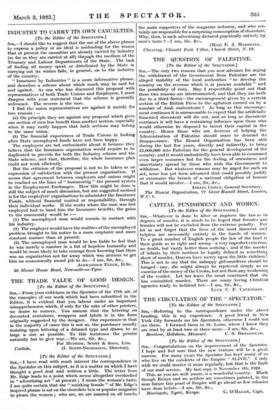INDUSTRY TO CARRY ITS OWN CASUALTIES. [To the Editor of
the SPECTATOR.]
Slit,—I should like to suggest that the use of the above phrase to express a policy or an ideal is misleading for the reason that at present the casualties are already carried by industry (so far as they are carried at all) through the medium of the Treasury and Labour Departments of the State. The task of finding all money spent or distributed by the State in carrying out its wishes falls, in general, on to the industry of the country. " Insurance by Industries " is a more informative phrase, and describes a scheme about which much may be said for and against. As one who has discussed this proposal with representatives of both Trade Unions and Employers, I must disagree with your statement that the scheme is generally welcomed. The reverse is the case.
I find the union representatives are against it mainly for two reasons :— (a) On principle they are against any proposal which gives one section of men less benefit than another section, especially when it may easily happen that both sections may belong to the same union.
(b) The financial experiences of Trade Unions in looking after 'State unemployed funds have not been happy. The employers are not enthusiastic about it because they believe that the Insurance organization would require to be duplicated to provide for both the Industry scheme and the State scheme, and that, therefore, the whole insurance plan could not work efficiently.
But the criticism of the proposal is not to be taken as an
expression of satisfaction with the present organization. It seems that agreement between employers and unions might be reached on the lines of " humanizing " the present system in the Employment. Exchanges. How this might be done is still the subject of much discussion, but one suggested method is for the employers' organizations to administer the Insurance Funds, without financial control or responsibility, through their individual works. If the works where the man was last employed had to hand him the Insurance benefits, the gains to the community would be :-
(1) The unemployed man would remain in contact with his industry.
(2) The employer would have the realities of the unemployed problem brought to his notice in a more emphatic and more constant manner than at present.
(8) The unemployed man would be less liable to feel that he was merely a number in a list of hopeless humanity and would be more likely to take courage from knowing that there was an organization not far away which was anxious to get him an economically sound job to do .—I am, Sir, &c.,
ALEXANDER FLECK, D.Sc.
20 Manor House Road, Newcastle-on-Tyne.










































 Previous page
Previous page